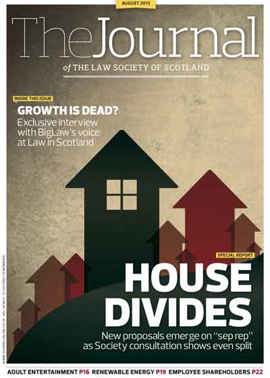Scottish Solicitors' Discipline Tribunal

Duncan Hamish Edward Kerr
A complaint was made by the Council of the Law Society of Scotland against Duncan Hamish Edward Kerr, solicitor, Aberdeen. The Tribunal found the respondent guilty of professional misconduct in respect of his failure to comply with the common law standard applicable to a solicitor acting for a lender in a conveyancing transaction and in particular his failure to report to his client unusual circumstances; his failure to comply with explicit instructions being the obligations imposed on him under the CML Lenders Handbook; his failure to act with absolute propriety and to protect the interests of his client being the lender in each transaction; and his failure to comply with rule 24 of the Solicitors (Scotland) Accounts etc Rules 2001.
The Tribunal ordered that the name of the respondent be struck off the roll of solicitors in Scotland.
After hearing evidence, the Tribunal did not accept the respondent’s assertions that he was unaware of his obligations in terms of the Handbook. Having regard to the source of the business, the same parties being involved, the multiplicity of transactions and the connection of all the parties, the Tribunal was satisfied that the respondent must have had knowledge of the course of conduct and this was not merely a lack of supervision. The respondent’s conduct amounted to a flagrant failure to comply with the applicable common law standard. In particular, he repeatedly failed to draw to the lender’s attention that these were back-to-back transactions and the purchase prices were not entirely within his control. The case also involved a wilful breach of the money laundering regulations in high risk transactions. The Tribunal considered that the respondent acted wilfully and persistently, lacked integrity and may well in the circumstances have facilitated mortgage fraud. His conduct fell at the higher end of professional misconduct. He had shown a complete lack of remorse or insight into the dangers he had created. The Tribunal concluded that the respondent was not a fit person to remain on the roll of solicitors.
John Knox Aitken
A complaint was made by the Council of the Law Society of Scotland against John Knox Aitken, solicitor, West Kilbride. The Tribunal found the respondent guilty of professional misconduct in respect of his conduct not being in accordance with the basic common law principle of honesty and integrity expected of a solicitor and not being in accordance with para 1 of the schedule to the Solicitors (Scotland) (Standards of Conduct) Practice Rules 2008.
The Tribunal suspended the respondent from practice for a period of five years.
The Tribunal was satisfied beyond reasonable doubt that the facts in the complaint were proved and that the respondent’s actions were sufficiently serious and reprehensible as to amount to professional misconduct bearing in mind the decision in Sharp. The essential qualities of a solicitor are honesty and integrity. In this case the respondent acted in a dishonest manner by pretending to his client that a court action had been raised when it had not. The respondent’s conduct was in clear breach of the Solicitors (Scotland) (Standards of Conduct) Practice Rules 2008 and damaging to the reputation of the legal profession. The Tribunal seriously considered striking the respondent’s name from the Roll, given the serious nature of his conduct and also taking into account the two previous findings of misconduct against him. The Tribunal however noted that this case concerned one client and one file and happened at a time when the respondent’s firm was in difficulty. The Tribunal had concerns with regard to the respondent’s obvious lack of remorse and considered that public confidence in solicitors would be undermined if the respondent was not suspended from practice. The Tribunal also considered it appropriate in terms of s 53(6) to order that the suspension take effect on intimation of the findings, to ensure that the respondent does not practise in the meantime.
John Buchanan
A complaint was made by the Council of the Law Society of Scotland against John Buchanan, solicitor, East Kilbride. The Tribunal found the respondent guilty of professional misconduct in respect of his failure to respond timeously and accurately to the reasonable enquiries made of him by the Scottish Legal Aid Board concerning the affairs of four of his clients, in breach of the Code of Conduct for Solicitors Holding Practising Certificates issued by the Law Society of Scotland in 2002, the Solicitors (Scotland) (Standards of Conduct) Practice Rules 2008 and the Solicitors (Scotland) (Civil Legal Aid and Advice and Assistance) Practice Rules 2003.
The Tribunal censured the respondent.
In this case the respondent failed to reply to the enquiries from the Board to ascertain the nature and extent of the recovery made on behalf of his clients. Numerous reminders were sent to the respondent seeking the information. As a consequence of the respondent’s failure to reply to these enquiries time and expense was incurred by the Board, who were unable to ascertain whether or not the clients whom the respondent represented required to repay a proportion of the costs of their legal advice. In doing so the respondent failed to comply with the principles accepted by him when he applied for and was accepted as a solicitor who was appropriately qualified to provide advice in terms of the legal aid scheme. The Tribunal accepted that dealing with the correspondence from the Board would not be solving the respondent’s individual clients’ issues, but it is imperative for the reputation of the legal profession that solicitors deal properly with the Legal Aid Board. Failure to respond to 69 letters is totally unacceptable and is sufficiently serious and reprehensible as to amount to professional misconduct. The Tribunal, however, took account of the fact the respondent had co-operated with the Society from the outset and had pled guilty to the complaint. It also considered that the respondent had shown remorse and insight and considered it unlikely that anything similar would happen in the future. It also noted that the respondent, through his agent, had taken steps to try and resolve any outstanding issues with the four cases. In the whole circumstances the Tribunal considered that a censure was sufficient penalty.
In this issue
- Widening access to the stocks and gallows?
- Family migration revisited
- The same but different
- Controlling tendency
- ESPC: out of the parental home
- Offshore employment: floating goalposts?
- Reading for pleasure
- Opinion column: David O'Hagan
- Book reviews
- Profile
- President's column
- Make the most of your "multiples"
- Sep rep: all to play for
- The bigger they are...
- Licensed to thrill
- Capacity challenge
- One year, and counting?
- Selling your rights... for what?
- The voice of technology
- A serious matter
- Relocation: where are we now?
- Whistle for reform
- Same sex marriage: for richer, for poorer
- Scottish Solicitors' Discipline Tribunal
- Residential property review takes shape
- In-house lawyers seek a rising star
- Mentoring: the way forward
- How not to win business: a guide for professionals
- Comm prop risks
- Ask Ash
- Crossed purposes
- Conference looks for profession to evolve
- Law reform roundup
- Help with the red flags






